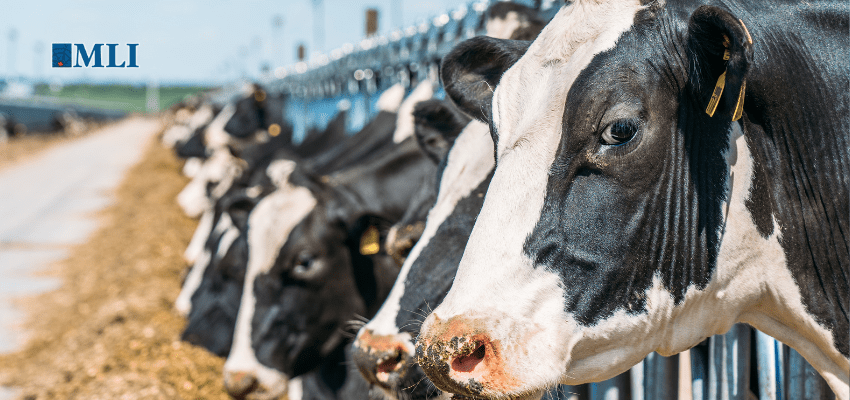This article originally appeared in Reason.
By Stuart J. Smyth, June 24, 2025
Canada’s oft-derided supply management system—a persistent irritant in many of the country’s trade relationships—is less focused on price stability, as Ottawa claims, but rather on protecting the dairy sector in one Canadian province. Canada’s future trade negotiations with the United States—or any other country with which it wishes to maintain a free trade agreement, for that matter—will likely put a spotlight on this issue.
In Canada, small, inefficient Quebec-based dairy operations are the primary beneficiaries of the antiquated mid-20th-century supply management strategy that remains in force north of the border.
This system once served an economic purpose. In the 1960s and 1970s, agricultural supply chains differed greatly from today. A lack of international trade rules and frequent use of tariffs significantly and adversely impacted the agricultural industry. At this time, governments around the world legislated to control production, seeking to stabilize domestic prices and farm income for some agricultural sectors—specifically the production of dairy, egg, and poultry products.
Over the past 50 years, supply chains have become more efficient and resilient, enabling countries to scale back or even eliminate these practices. Canada, however, has consistently failed to remove these mechanisms. For political reasons, everyone else is paying the price—and it’s costly.
When governments control production levels, they create incredible industry inefficiencies. Supply-managed sectors provide clear evidence of this. For example, an estimated $11 billion worth of raw milk was simply dumped onto the ground and wasted in Canada between 2012 and 2024 in order to avoid exceeding production quotas.
There are just over 4,200 dairy operations in Quebec out of 9,400 nationally. The objectives of supply management focus on protecting these 4,200 operations at the cost of the other 190,000 Canadian farmers, as well as Canada’s 40 million citizens.
Although dairy operations in Alberta, Saskatchewan, and Manitoba are more than twice as large as those in Quebec, the government restricts milk production in the three western provinces to 16 percent of total domestic production, whereas Quebec accounts for 37 percent.
The American dairy sector shows there’s a different path that Canada could follow. Dairy production efficiency in the United States has resulted in Idaho and Wisconsin being the second- and third-largest milk-producing states. Supply chain logistics allow for the transportation of dairy products to reach markets across the U.S. In Canada, market concentration would likely shift to more efficient producers in the western provinces if supply management were to end.
Not only would this contribute to lower dairy prices for all Canadian consumers, but it would also make a difference for Canada on the world stage by boosting the country’s position in international trade negotiations. As long as the system remains in place, it will be an irritant.
In all of its trade negotiations over the past decade, Canada has been required to grant concessions and allow greater volumes of tariff-free imports. In 2015, when negotiating the Trans-Pacific Partnership, Canada was forced to make concessions on dairy products worth 3.25 percent. It made further concessions during the 2016 negotiating process of its free trade deal with Europe, and again in the negotiations leading to the 2020 Canada-United States-Mexico Agreement (CUSMA). As concessions were made, Ottawa provided billions to domestic dairy producers to compensate them for increased competition, further supporting the sector’s inefficiencies.
Following the United Kingdom’s departure from the European Union, it sought to quickly establish trade deals with other countries. Concluding a trade agreement between Canada and the U.K. should have been a quick and simple matter. However, Canada’s refusal to make concessions on supply management has prevented an agreement from being reached.
This unwillingness to drop the outdated system leaves Canada at significant risk of never negotiating another international trade agreement due to its adherence to preserving supply management.
Yet, the domestic politics that preserve the system persist.
In 2022, as part of the political protection against market inefficiencies, the Bloc Québécois—a separatist party that sits in the Canadian Parliament, and only runs candidates in Quebec—introduced Bill C-282, which would prevent all future Canadian governments from negotiating concessions that would negatively affect the supply managed production of dairy, egg, and poultry products in Canada. This bill died when the 2025 federal election was called. However, one of the Bloc’s first actions in the new Parliament was introducing another bill, now listed as C-202, with an identical objective: preventing any supply management concessions.
The bill’s reintroduction, and the unanimous support it received in the House—including from the governing Liberals—followed by its swift passage through the Senate, indicates Canada is not serious about renegotiating the CUSMA. The Trump Administration has clearly indicated that greater access to Canada’s supply-managed sectors will be a key objective for them in any negotiation.
Continued rigid adherence to obsolete, anti-competitive supply management policies will mean that Canada will never be able to negotiate or renegotiate any future trade agreement.
is a professor at the University of Saskatchewan’s Department of Agricultural and Resource Economics and a contributor for the Macdonald-Laurier Institute.






